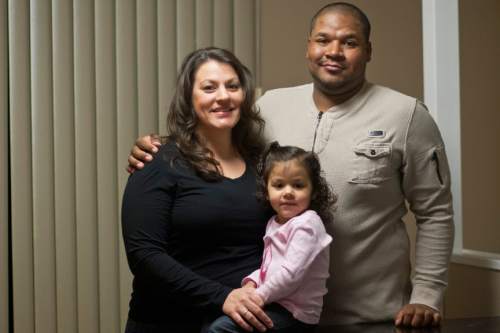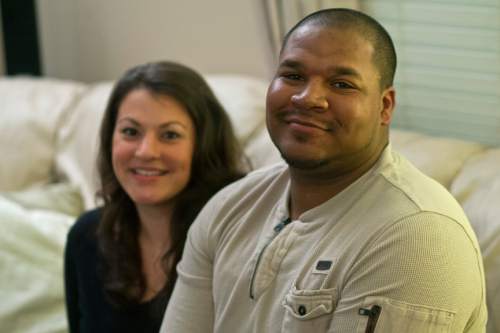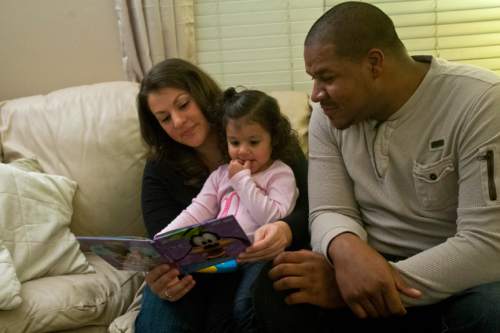This is an archived article that was published on sltrib.com in 2014, and information in the article may be outdated. It is provided only for personal research purposes and may not be reprinted.
A sharply divided Utah Supreme Court ruled Tuesday that in order to establish paternity, unwed biological fathers must file a sworn affidavit saying they are able and willing to support their child.
If the father fails to meet this requirement of the Utah Adoption Act — along with other provisions, including registering a paternity notice with the state — he cannot object to an adoption, the court said.
The decision was a defeat for William E. Bolden, an unmarried father who contested the adoption of J.S., whom his ex-girlfriend placed for adoption in 2011. Bolden had fulfilled the other requirements to claim paternity of the child, but failed to file the affidavit.
Scott Wiser, one of Bolden's attorneys, said an appeal to the U.S. Supreme Court might be an option.
Bolden, 30, a South Ogden resident who works in construction, said the ruling was disappointing but that he hasn't given up hope.
"It's been a really rough struggle so far and today was a big letdown," he said.
Bolden, who also has a daughter, said he has not had contact with his son since soon after the child's birth in March 2011, but has been sending him birthday and Christmas presents through attorneys. He doesn't know if the child gets them, he said.
In the majority opinion, Justice Thomas Lee wrote that the affidavit requirement protects "the best interests of children by giving voice in their adoption to those who have established a demonstrated commitment to their well-being."
The opinion rejects the argument that the affidavit discriminates against unmarried fathers because unmarried mothers are not required to provide similar assurances about how they will care for and support a child. It says a father's role is inherently different because his connection to his child might be unknown or indeterminate.
"The affidavit is defensible as an attempt to put unwed parents on equal footing," Lee wrote in the opinion. "Mothers express their commitment to their offspring through the voluntary decision to carry a child to term — a decision that commits them to the statutory responsibility of caring and providing for the child as a legal parent."
Chief Justice Matthew Durrant and Utah Court of Appeals Judge Gregory Orme — sitting in for Justice Christine Durham, who had recused herself from the case — concurred that Bolden was barred from intervening in the adoption because he failed to preserve his legal rights.
But Justices Ronald Nehring and Jill Parrish each wrote a dissenting opinion, arguing the affidavit requirement unconstitutionally discriminates against unwed fathers on the basis of gender.
Nehring called it "repugnant to the principle of equal protections enshrined in both the United States Constitution and the Utah Constitution."
"The affidavit requirement reflects a negative stereotype that is commonly wielded against unwed fathers: that they are uninterested in their offspring and ill-suited or incompetent caregivers," Nehring wrote.
He added: "Indeed, this stereotype is precisely the flip side of the same generalization that has long been applied to women — i.e., that they are naturally well-suited for the responsibilities of childcare and the home."
According to court documents, Bolden — who was then represented by a different attorney — filed a notice of paternity with the Utah Department of Health and a court paternity petition in mid-March 2011, about two weeks before the expected birth of his child. But his then-attorney failed to advise him of the need to also file the sworn affidavit, he says.
Bolden said he made it clear to his ex-girlfriend and LDS Family Services, which handled the placement, that he opposed an adoption. However, three days after the child was born, after learning Bolden had not signed his paternity petition or filed the sworn affidavit, the birth mother decided to place the child for adoption, court documents say.
The adoptive parents, called John and Jane Doe in court documents, knew Bolden's identity and that he had made some effort to establish parental rights, the documents say. But they asserted Bolden had no rights because he did not comply with the affidavit requirement and notified him of their intent to adopt without his consent.
Bolden then got new lawyers — Scott Wiser and his father, Mark Wiser — and challenged the constitutionality of the affidavit requirement and asked to have the Does' adoption petition dismissed. In 2012, 4th District Judge Lynn Davis ruled against him, leading to the Utah Supreme Court appeal.
Scott Wiser argued before the high court in June 2013 that the affidavit is duplicative and discriminatory.
But Larry Jenkins, an attorney representing the child's adoptive parents, argued at the hearing that a birth mother's connection to her child is clear cut and the state has a legitimate interest in requiring unwed fathers to not only declare paternity but provide a sworn statement as to how they will fully meet parental responsibilities.
Twitter: PamelaMansonSLC —
The four requirements in Utah adoption law
Utah's law has four steps that unwed biological fathers must follow before a birth mother consents to an adoption in order to intervene:
File a paternity petition in court.
File a sworn affidavit in court stating he is able and willing to have full custody of the child, detailing child care plans and agreeing to a court order of support and payment of pregnancy and birth-related expenses.
File a notice of commencement of a paternity action with the state vital statistics registrar.
Show, unless he was unaware of the pregnancy until birth, proof he offered to pay or paid pregnancy and birth-related expenses.







